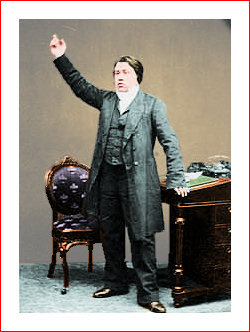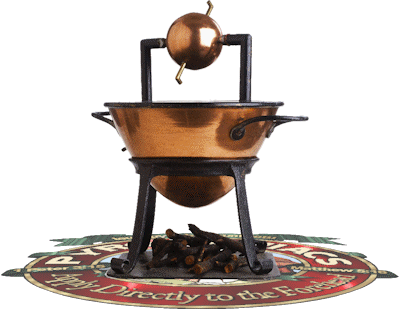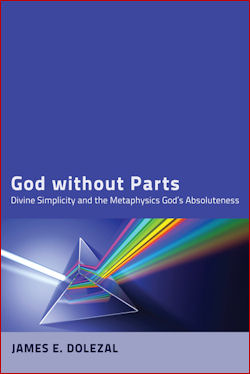Your weekly dose of Spurgeonposted by Phil Johnson
The PyroManiacs devote some space each weekend to highlights from The Spurgeon Archive. The following excerpt is from an article in the April 1868 issue of the The Sword and the Trowel, titled "Dr. John Caird on the Declining Influence of the Pulpit." Spurgeon is responding to Caird's claim that English pulpits had become ineffectual because preachers weren't erudite enough.
(Dedicated to Dr. Karl Giberson, Ph. D.)
ot that our present prophet bids us humble ourselves, or seek the Lord by prayer, or invoke the energy of the Holy Ghost, or wait upon the great Head of the Church for deliverance; far from it; he has no burden from the Lord as to such "archaic" and "conventional" instructions; his message to this enlightened and thoughtful age is far better adapted to the present times and the existing phases of society.
He sees no need to warn ministers to cultivate fellowship with God, but much more cause to bid them keep abreast of the culture of the age and know something of what its deepest speculators have said and its sweetest poets have sung.
He is not afraid lest the cross of Christ and the doctrines of the gospel should be obscured by human wisdom, but he is very severe upon those "who insist upon our identifying divine truth with the historic accidents and archaic forms in which it has been couched, with the literal interpretation of the language of allegory and symbol, with statements, which true and beautiful as poetry, lose their reality and beauty when construed as literal fact."
What that fine jargon means, those who are acquainted with Broad School inuendoes very well know. Sermons are not recommended to be baptised with power from on high, but it is said to be of the first importance that they should bear traces of careful thought, logical arrangement, consecution of argument; conclusiveness of result; they must contain novel and interesting interpretations of Scripture, and sparkle with imagery: lacking these the auditor goes away discontented, and reads with entire assent a sneering article in the next
Times, or
Saturday Review, on the decline of the pulpit in modern times.
Now we are prepared to endorse any man's opinion who shall say that it is most desirable that our ministers should be well educated, and should command respect by their substantial attainments, but we are indignant when we find these secondary matters thrust into the first place, and the weightiest of all considerations compared with which these are light as feathers, thrust into oblivion.
Moreover we are not prepared to allow that the school of preaching which the writer of the
Good Words article would desiderate would be any gain to the church or to the world if it could be called forth from our universities and theological schools; on the contrary, we believe that no greater calamity could befall mankind than to be preached to by such men as "the highly cultured and fastidiously critical class" would patronise.
The high culture of a mortal man! Bah! How ludicrous it must seem to the Eternal mind! Vain man would be wise, though he be born like a wild ass's colt. Refinement of intellect to be the guide of gospel ministrations! What then means the apostle when he says, "And I, brethren, when I came to you, came not with excellency of speech or of wisdom, declaring unto you the testimony of God, for I determined not to know any thing among you, save Jesus Christ, and him crucified. And I was with you in weakness, and in fear, and in much trembling, and my speech and my preaching was not with enticing words of man's wisdom, but in demonstration of the Spirit and of power: that your faith should not stand in the wisdom of men, but in the power of God. 1 Cor. 2.
When men who imagine themselves to have great genius, and to be qualified judges of pulpit excellence condescend to descant upon their brethren, they have generally a superabundance of sneers at hand. While they themselves may never have won for Jesus a dozen hearts in all their lives, those earnest evangelists who are instant in season and out of season, and whom their Master honours with his Spirit's approbation, are ridiculed as "showy, ready-tongued, loud-voiced, shallow declaimers," whose dogmatism is rigid in proportion to its feebleness.
Saul, because he is head and shoulders taller than others, despises the shepherd, forgetting whose hand it was that slew Goliath, or perhaps hating him the more because he had wrought a service of which the monarch was incapable. Indifferent themselves to the very fundamentals of truth, craving always a liberty to depart from the standards of the faith, and yet to eat the bread of the church, the gentlemen of the superfine, cream-laid order, hang up before men's eyes a caricature of the "faithful" minister who adheres steadfastly to the once-delivered faith, and point at him the finger of scorn.
To preach the gospel as it is revealed is to these men to be servile; to mutilate it is independence of mind; to be simple and fervent is to adopt conventional verbiage and conventional solemnity. Yes,
conventional. That is the word, which is over and over again dealt out judicially, as though it meant something criminal.
Scattered all over England and Scotland are self-educated men who have been called of God to be soul-winners, who care not a jot for what Darwin or Colenso, or even the great Scotch Latitudinarians may have to say for themselves who are doing their work all the better because they have eschewed the refinements of modern scepticism, and have not come into the secret of the new liberalism. These may be pooh-poohed as much behind their times, but we are persuaded that they have contributed far more to maintain the power of the pulpit than anything which has been achieved by the
"deep-thinking" and free-thinking doctors and professors with all their boasts.
If the pulpit be declining in power, it is due in a great measure to the men who mistake error for freshness, self-conceit for culture, and a determination to go astray for nobility of mind. So far from despising brethren of small literary accomplishments who excel in spiritual power and life, it is our duty to have them in abundant honour, to cheer them under their difficulties, and imitate them in their industrious use of their few talents. They can arouse a conscience though they cannot elucidate a problem; they can stir the affections, though they cannot revel in poetic imagery; they can reclaim sinners, though they cannot mystify with subtleties.
If the fields of literature and science do not entice them, have they not enough of understanding if they are mighty in the Scriptures?
If they are devoid of the fear of "creating an aversion in men of taste to evangelical religion," may it not suffice them to have a holy fear of being unfaithful to the consciences of men?
Suppose that they do not quote from learned authorities, does not the word of God possess a superlative authority in its authorship and truth?
What if they never attempt to prove a doctrine of revelation by an appeal to so-called "natural religion," have not the truths themselves a self-evidencing power?
They have not denounced their more learned brethren, or laid the supposed decline of the pulpit at their door. Where then is the politeness and refinement so much vaunted? Is it needful to say where is the Christian spirit which allows the
"intellectual" and
"cultured" to talk so lightly of men whom the Lord has chosen?
Are supercilious arrogance and censorious uncharitableness the choice fruits of "thorough culture"? Then, thank heaven, there are a few who have escaped the privilege, and can yet believe that whether learned or unlearned, gracious men may do good service for Christ.
The fact is that the cant which dins into our ears such ungenerous phrases as "superficial culture, and narrowness of thought," "shallow dogmatism and merest platitudes," and smirkingly boasts its own intellectual superiority, is known to be cant by all thoughtful men, and is treated as such.
When
the celebrated Cobbler How, with much learning, proved the uselessness of all learning, men smiled, and went on their way, but when professors A, B, or C, with much scorn, traduce their less philosophical brethren, some men think it time to rebuke them sharply for their own sake and for others.
There is no truth whatever in the cry of the fastidious school;
the world will no more be saved by carnal wisdom now than in times gone by. When our Lord selected his apostles they were evidently chosen not on account of their intellectual endowments or scientific acquisitions, but on account of their religious character. John was perhaps accustomed to better society than Peter. Luke may have enjoyed a good education; Paul was skilled in the learning of the schools; but the rest were men of little scholarship. It would seem that our Lord chose as the first preachers of the gospel men of every variety of attainment and grade of intellectual culture, neither repudiating nor glorifying intellect, but using it and everything else that is human for his own glory.
"But," says Dr. Wayland, "It will be said, of course, that our circumstances at the present day are very different from those at the time of the apostles. This is more easily said than proved. The whole world of heathenism was then arrayed against the church of Christ. Never was the cultivation of the intellect and the taste carried to higher perfection. The poets and orators, the historians, sculptors, and architects of this heathen world, are, to the present day, our acknowledged masters. The church of Christ was sent forth to subdue this cultivated and intellectual world, and the masses associated with it.
And what was the class of men of whom this church and its leaders were composed? They were stigmatised as unlearned and ignorant. The intellectual difference between them and the men whom they were called to meet, was as great in the times of the apostles as it has ever been since. Yet God chose the weak things of the world to confound the mighty. When men of more disciplined mind were wanting, they were called by the Head of the church; but even here, the greatest of them all declared that he made no use of excellency of speech, or of wisdom, in declaring the testimony of God; that he determined to know nothing but Jesus Christ and him crucified. There is nothing really in the relative condition of the parties which would render a rule inapplicable
now which was applicable
then."We greatly doubt whether the Christian pulpit was ever more generally powerful than at the present moment; certainly congregations were never larger, nor religious effort as a rule more abundant. Far enough are we from being satisfied, but still there is much to rejoice over as well as much to deplore. We could rehearse the names of a score of active, useful, attractive, spiritually-minded evangelists, all exceedingly popular and powerful, and this we the more rejoice in because this class has only of late been called into existence.
In our own denomination alone we have pastors whose churches from year to year increase at a ratio altogether unprecedented in modern times. Bad as things are they are not worse, but much better than formerly, and this is owing mainly to the growing power of the pulpit. We do not believe that our educated people care an atom for the brilliant sermons which Mr. Caird would prescribe for them. The thoughtful and intellectual men with whom we are acquainted, tell us that they do not want that kind of refreshment on the Sabbath; being eminent in their professions they find enough of the intellectual in their daily work, and are just the men above all others who delight in the simple, earnest appeal to the heart and conscience.
Preach Christ to them with the Holy Ghost sent down from heaven, and they will be content, but try to dazzle them with the fireworks of intellectual display, and they will tell you that the articles in a respectable review are far preferable.
If, indeed, the ministry be declining in power, let us betake ourselves to the grand resource of prayer; let us invoke the Holy Spirit's aid; let us pray the Lord of the harvest to send forth labourers into his harvest. Then as matters of detail let us purge our colleges of sceptical professors, let us make the training more homiletical and less metaphysical, let us seek after unction rather than intellect, and encourage our young men in pursuits of practical evangelism rather than speculative theorising. In opposition to learned men, who by elaborate essays cry up the Diana or Minerva of their idolatry, let us look to the heavenly Comforter, and have respect unto that Scripture,
"Not by might, nor by power, but by my Spirit, saith the Lord."
 The book considers the purpose of Proverbs, what proverbs are. How they may (should ) be used, etc. You will learn much about Proverbs, in general. Very few verses are considered out of a book as large as Proverbs, but from those that are, you learn how to go about understanding and using the book.
The book considers the purpose of Proverbs, what proverbs are. How they may (should ) be used, etc. You will learn much about Proverbs, in general. Very few verses are considered out of a book as large as Proverbs, but from those that are, you learn how to go about understanding and using the book. 






 ur missionaries and our clergymen have assumed a kind of superiority and dignity over the people; they have called themselves clergy, and the people laity; and the result has been that they have weakened their influence.
ur missionaries and our clergymen have assumed a kind of superiority and dignity over the people; they have called themselves clergy, and the people laity; and the result has been that they have weakened their influence.

 t's the day after Thanksgiving, and it would be gauche to complain on such a day, so let me just say that one of the things I'm most thankful for is that this week is finally nearing an end.
t's the day after Thanksgiving, and it would be gauche to complain on such a day, so let me just say that one of the things I'm most thankful for is that this week is finally nearing an end.
 My other reading selection on this trip is
My other reading selection on this trip is 








 hanksgiving (the constant kind, not the once-a-year variety) is a good exercise for the out-of-control tongue. Ephesians 5:4: " Let there be no filthiness nor foolish talk nor crude joking, which are out of place, but instead let there be thanksgiving."
hanksgiving (the constant kind, not the once-a-year variety) is a good exercise for the out-of-control tongue. Ephesians 5:4: " Let there be no filthiness nor foolish talk nor crude joking, which are out of place, but instead let there be thanksgiving."
 ot that our present prophet bids us humble ourselves, or seek the Lord by prayer, or invoke the energy of the Holy Ghost, or wait upon the great Head of the Church for deliverance; far from it; he has no burden from the Lord as to such "archaic" and "conventional" instructions; his message to this enlightened and thoughtful age is far better adapted to the present times and the existing phases of society.
ot that our present prophet bids us humble ourselves, or seek the Lord by prayer, or invoke the energy of the Holy Ghost, or wait upon the great Head of the Church for deliverance; far from it; he has no burden from the Lord as to such "archaic" and "conventional" instructions; his message to this enlightened and thoughtful age is far better adapted to the present times and the existing phases of society.













 ot began his career as a tent-dweller like Abraham. But after he parted from his uncle, Genesis 13:12 says "he pitched his tent toward Sodom." Soon he moved into the city and became comfortable there.
ot began his career as a tent-dweller like Abraham. But after he parted from his uncle, Genesis 13:12 says "he pitched his tent toward Sodom." Soon he moved into the city and became comfortable there. "Lot's wife, behind him, looked back, and she became a pillar of salt" (Genesis 19:26).
"Lot's wife, behind him, looked back, and she became a pillar of salt" (Genesis 19:26).








